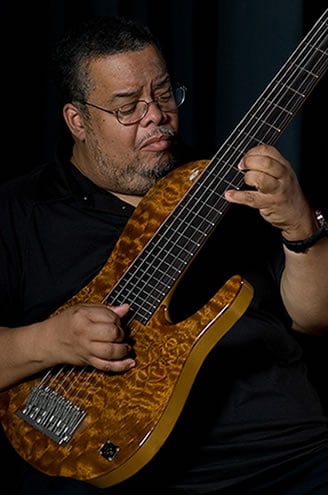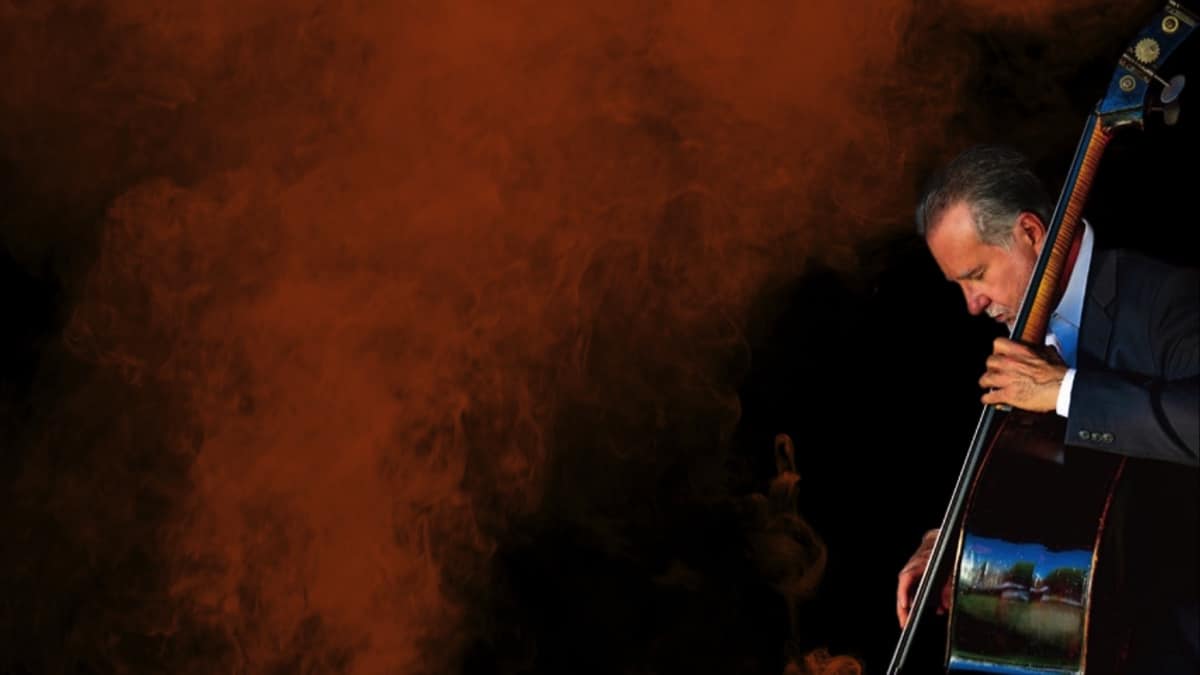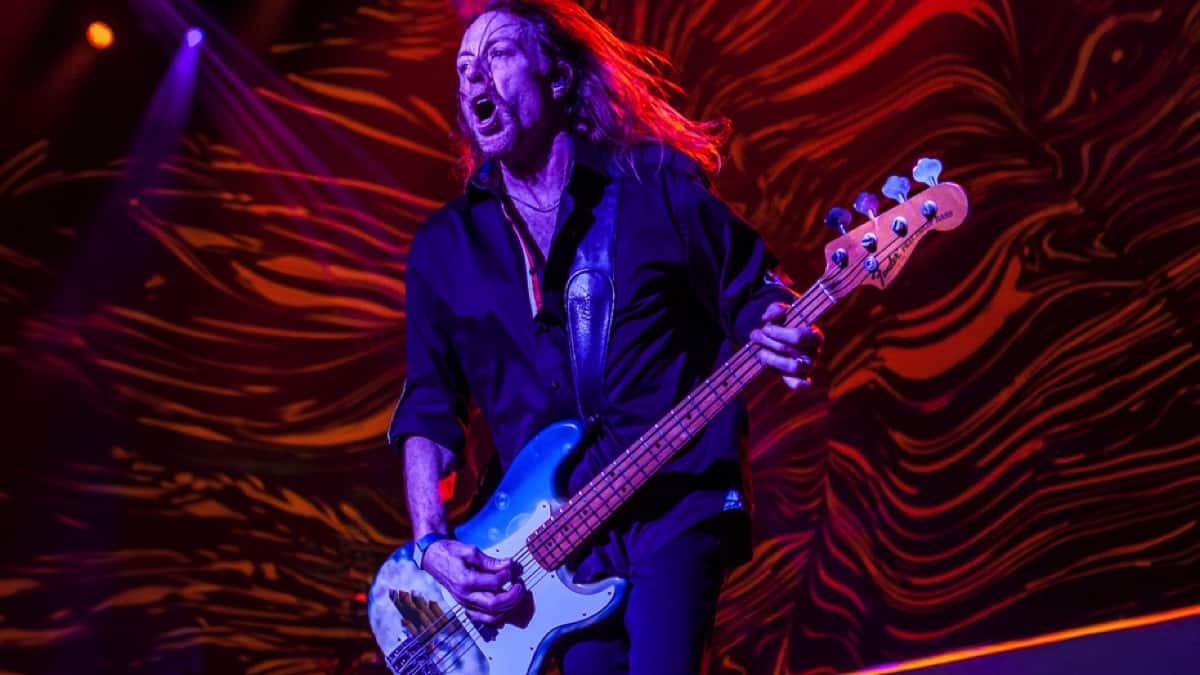Cover
Bass Musician Magazine: Apr/May 2009 Issue Featuring Anthony Jackson

Jake: Was the music written first, and then the players would be decided upon after that, or was it the reverse?
Anthony: I gave him composer’s prerogative. He knew the people that he would like to work with. This all kind of started because I’m not a composer. I do not have serious compositional gifts. I am an interpretive performer, and I realize that it’s much easier for me to have other people do the writing for me, and then I would let the composer make the decisions on who to use. This was not the case for the trio I was trying to put together, where I would have chosen the people involved. With the players I would have decided to use, I would have then more or less had a consultation with them to decide who else I would possibly be using on particular pieces. For this project, with Yiorgos taking the sole hand as composer, I decided to let him make those decisions. And of course the people that he wanted to use, such as Weckl, are very long time friends and close colleagues, and I knew we would have no conflicts about who to call. Yiorgos and I think very much alike, so that was never an issue.
Jake: Could I ask, out of curiosity, what keyboard player you were thinking of using when you were putting together that trio?
Anthony: No, out of respect to how he would feel. It would have been a ‘triple A’ first class ensemble. I ‘can’ say that there were a very small number of people I would have considered. There are many keyboard players that have had the training to be able to write, but many times their ideas were not that inspiring to me. I strive to be associated with players and writers who knock my socks off, 100% of the time, every time I sit down to play or listen, and there are very few people like that.
Jake: Directly related to your new CD, I wonder what your thoughts are as far as releasing this project under a record label, or do you think at this point in time it might be wiser to release it yourself as an independent, which more and more artists seem to be gravitating to?
Anthony: I need consultation to make that decision. I haven’t the slightest idea on how I’d pursue that, nor do I have any interest at all in that area. I don’t care how it gets distributed; I’m strictly concerned about what’s on it. I’ll leave those other things to people that know more than I do. If I get involved in that, I’d probably do something very idealistic, that would be admired, but might not go anywhere. The rules of record distribution have changed. It continues to evolve. I listen to what I hear, but I don’t know how to apply the things I hear to this project. First of all, it’s a shared project. It’s also based far outside of the U.S. There probably aren’t any people here who know how it would be handled in the U.S. There are too many unknowns and too many things that I don’t think I can supply the answers to as far as this is concerned. This is a job for a specialist in this area, and me not being one means I’m going to keep my hands out of it. I’m sure there will be people interested in arranging for distribution, but I’m not that person.
Jake: One of your distinct strengths is your ability to re-harmonize a chord structure within your playing. Is this more or less instinctual for you at this point, or do you take the time to study a progression with that in mind?
Anthony: It’s never fully instinctual because there’s always going to be a situation in which you are challenged for your decisions to do something with somebody else’s music. I make certain that I’m sure about what I’m doing, and in that sense it’s not instinctual. There is a measured intelligence behind what I’m doing that’s out of respect for the composer. If I were a composer, I might not take it to well when somebody comes along and starts messing with what I’ve written, and on the other hand I might be really fueled by it, but I certainly would want an explanation. Why did you decide to do this—what is it that made you decide to do that? And if you did make some changes, you’d want to be able to tell people what you’re doing, and would that kind of self knowledge armed with that kind of analytical knowledge make it possible to make decisions very quickly and very decisively about how to re-interpret something? So it’s not instinctual in the sense that I’m not thinking about it, and just throwing things out there until something sticks to the wall. There’s always some kind of let’s say virtual roadmap. Nothing that becomes a formula such as, OK, we’re doing this kind of tune like a jazz-blues thing, and this is what I do for that kind of tune, and then, ah-hah, we find it’s more like a funk thing or a little fusion thing, and now “this” is how I’ll interpret that. That’s not how it works. It’s not formulaic, although I certainly do repeat myself, its impossible not to. At times you can recognize somebody for “how” they have modified something, like that’s something only Anthony Jackson would do, or that’s something only Steve Gadd would do—-you’re going to have some of that. Basically, it’s an informed re-harmonization or shall I say re-composing. It does involve a sensibility, although it is improvisation.
Bass Videos
Brian Bromberg, Paying Tribute to Scott LaFaro, April 2024

Brian Bromberg, Paying Tribute to Scott LaFaro, April 2024…

Brian Bromberg is one heavy-hitting bass player and I am in awe of his talent as one of the few individuals who is equally proficient on electric and upright bass.
You might remember our conversation back in 2018 when he released his powerhouse Funk album. Brian’s “A Little Driving Music” album is a staple on all our road trips and his Jaco and Jimi Hendrix tribute albums are mind-blowing… and I could go on and on.
Now, Brian has taken on the arduous task of producing an album paying tribute to the late, great, Scott LaFaro. He teamed up with pianist Tom Zink and drummer Charles Ruggiero and Brian delivers a commanding performance on upright. The entire album is a masterpiece and a real treat to listen to track after track.
Join us as Brian shares the details behind this project and more.
Photo, Michel Bocandé
Featured Videos
Visit Online
brianbromberg.net
FB @BrianBrombergBassist
YouTube
Cover
Leland Sklar, Over Half a Century of Bass, March 2024

We all have enjoyed Leland Sklar’s Bass lines for over half a century.

You might remember that we had him on our cover back in 2017 and did an update when he launched his book “Everybody Loves Me” in 2020. It was exciting to hear that The Immediate Family had got back together in the studio to work on their own music in 2019 and are now up to two albums.
Just last December, Magnolia Pictures released a documentary titled “Immediate Family” where we got a behind-the-scenes look at the massive contributions Danny Kortchmar, Waddy Wachtel, Ross Kunckle, Leland Sklar and Steve Postell have made in countless songs that are the very essence of our daily personal musical soundtracks. Seeing the astronomical roster of performers they have supported over many years is very eye-opening. It is a must-see for any music lover!
Now, I am thrilled to bring you a special chat with Leland Sklar where we go more in-depth into the bass side of his musical journey.
Photos: Header, Rob Shanahan – Cover Photo, Jay Gilbert/Chris Schmitt
Featured Videos:
Skin In the Game – https://www.youtube.com/watch?v=QhbnzIrdjJ8
from new album Skin In The Game
The Toughest Girl In Town – https://www.youtube.com/watch?v=UVQLZIRfLjU
from new album Skin In The Game
Fair Warning – https://www.youtube.com/watch?v=1DN18DYwLsU –
from the self-titled album The Immediate Family
Visit Online
www.immediatefamilyband.com/
www.facebook.com/TheImmedFamily
www.instagram.com/theimmedfamily/
Bass Videos
Ricky Phillips, STYX Bass And More – February 2024

Ricky Phillips, STYX Bass And More…

I have always been a huge Styx fan. Their music kept me awake during countless nights studying and gave my imagination a place to escape when I had a moment to take a break.
I had the immense opportunity to chat with STYX bassist Ricky Phillips for our August Cover in 2017 and follow his projects as time passed. Now, I am thrilled to have the opportunity to catch up with Ricky as he has been super-busy over the past six years.
Join me as we take a deep dive into the band’s most recent album “Crash the Crown” and EP “The Same Stardust”. Ricky shares some insights into the herculean team effort behind the scenes and the musical process that keeps them ever so busy and how he has updated his sound.
Without further ado… Here is Ricky Phillips!
Photo: Jason Powell
Featured Videos:
“Crash of the Crown” lyric video
“Reveries” lyric video
“Save Us From Ourselves” lyric video
“Sound the Alarm” lyric video
“Too Much Time On My Hands” Zoom video 2020
Visit online:
www.Styxworld.com
FB & IG @styxtheband
Bass Videos
Jeff Pilson, Foreigner Low End – January 2024

Jeff Pilson, Foreigner Low End – January 2024…

Those of us who were around back in the 70’s remember how certain songs on the radio resonated with us. It turns out that many of these iconic melodies came from Foreigner and they were part of our personal soundtracks!
After all these years, the band is going as strong as ever with Jeff Pilson firing away on bass midstream into a 2-year farewell tour.
I am excited to be able to bring you all the details about Jeff’s musical Journey, the farewell tour in progress, how he gets his sound and his plans for the future.
Cover Photo: Krishta Abruzziini / Video Photos: Krishta Abruzzini, Karsten Staiger, Gina Hyams
Featured Videos
For more news on FOREIGNER and upcoming Farewell Tour dates, fans can visit:
foreigneronline.com
facebook.com/Foreigner
twitter.com/ForeignerMusic
instagram.com/foreignerlive
youtube.com/user/FWebTeam
Also on FB @officialjeffpilson
Bass Videos
Rodney O’Quinn, Rockin’ Hard Through the Years – December 2023

Interview With Foghat Bassist Rodney O’Quinn…

Many rock fans have enjoyed music by Foghat, who originally formed in London back in 1971.
Over the many decades of playing, the band members have changed, leaving behind only Roger Earl as the only original member. Bassist Rodney O’Quinn left the Pat Travers Band and joined the group in 2015 and has been laying down the low end for this iconic quartet keeping the Foghat legacy alive. With a new album titled “Sonic Mojo” which dropped on November 10th, the band is as busy as ever and there is lots of very tasty music to come.
Join me as we learn of Rodney O’Quinn’s musical journey, how he gets his sound, and his plans for the future.
Photos:
Cover, Jake Coughlin
Video Thumbnail, Tom Apathy
Photos used in the video: Kerry Quinn, Chuck Lanza, Kim Granger, Kenneth Strohm, Jake Coughlin, Jay Jylika
Featured Videos:
1st Single from Sonic Mojo – Official “Drivin’ On”
2nd Single from Sonic Mojo – “She’s a Little Bit of Everything Official Video
“Road Fever”- California Mid State Fair – Paso Robles, CA – 7-27-22
“Stone Blue” – Rodney O’Quinn Bass/Lead Vocals – Don Odell’s Legends – Woonsocket, R.I – 10/15/22 – The Stadium Theater
The Earl’s Court – Season 2, Episode 7: Funny Guys
“I Just Want to Make Love to You” – CasinoRama – 6-9-23
FOGHAT “Somebody’s Been Sleepin’ in My Bed” – Mohegan Sun, Uncasville, CT – 1/28/22
“I Just Want to Make Love to You” – California Mid State Fair – Paso Robles, CA – 7-27-22
Visit Online:
www.foghat.com
www.facebook.com/Foghat
www.twitter.com/FOGHAT
www.instagram.com/foghat_official
www.youtube.com/user/FOGHATMUSIC


















